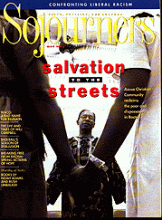Bill Clinton believes in a place called Hope, and he has, I think, given us reason to believe with him. We can and should celebrate the end of the Reagan-Bush era and rejoice in a president who is genuinely concerned about real people and their troubles. Even more important, Clinton is a consensus builder, which provides us with an opportunity we have not had since the Carter years: the opportunity to participate in the national debate.
We must begin, however, with an honest recognition of who Clinton is and the limits of the hope he holds out. Despite clear indications Clinton has given of his foreign policy direction, many in the peace and justice movements are almost pretending he didn't mean it. Some hope that all the election year tough talk was just election year tough talk. Others say that Clinton's focus is on domestic issues, not the New World Order. Everyone seems to put more stock in his opposition to the Vietnam War than his support of the Gulf war.
Clinton's campaign message was, "The economy, stupid," but the bottom line is in his budget plans. Over the next four years, Clinton proposes to increase revenues by $274 billion and cut spending by $223 billion. A little more than a fourth of the spending cuts come from the military. Over the same four years, Clinton proposes to spend $1.35 trillion on the military. George Bush would have spent $1.42 trillion, just 5 percent higher than what Clinton will spend.
Why? What foreign policy agenda justifies spending $1.35 trillion? Why should the United States continue to spend $1,200 per person per year on its military when Germans spend a quarter of that and Japanese a tenth? George Bush justified military spending by pointing to the New World Order he sought to build. Clinton has yet to find a title for his policy, but again and again he has used a phrase that summarizes it: "The world is a dangerous place."
Read the Full Article

